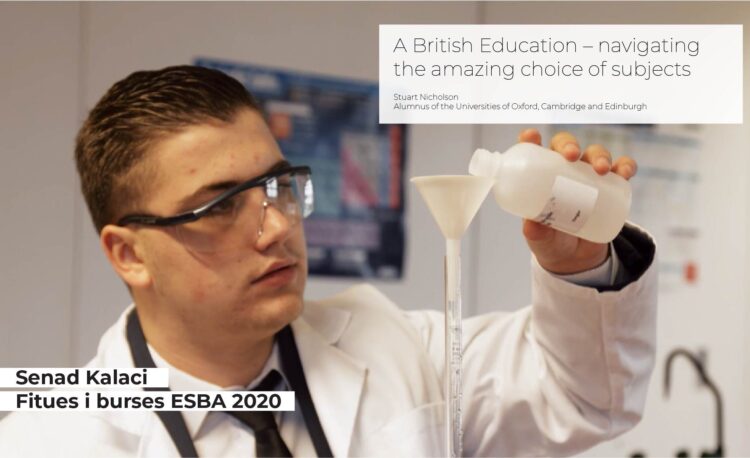Across the world, students at secondary school typically study 10 to 15 subjects. They might have a little bit of choice, but most subjects are compulsory. They must study their native language, they have to study mathematics, they all have to do science and a foreign language (often English), usually there is some social studies and humanities. These subjects are taken all the way through school, a wide range of subjects whether you enjoy them or not, and whether you are good at them or not. Most students love some of their subjects and either dislike or are bored by the others.
In the British system, the situation is very similar until students are 16 years old and go into the last two years of the school system. When they are 16 they take examinations in the wide range of subjects that are expected in most parts of the world, but they are then allowed to choose their three or four favourite subjects, with an incredibly wide selection available to them, not just the typical 10 or 15 subjects that might be expected.
The final two years of school cover what is known as advanced level education (or A-levels), which provide specialisation and depth in usually three subjects, or sometimes four in some circumstances. The number and variety of possible A-levels is enormous – there are over 50 subjects that students can select from. A-levels can be taken in accounting, business, law, media studies, computer science, philosophy, psychology, politics, statistics, sociology, Hebrew, classical civilisations, Persian, Turkish: range of subjects is amazing.
It is not a requirement to study English or mathematics – the choice is completely free and it depends on the strengths and interests of the student, and on what the student wants to study later at university.
For some degree subjects, it does not matter which subjects are chosen at A-level. Far more important is getting good grades, which means selecting your favourite subjects that you know you will really enjoy and at which you will enjoy working hard.
Other degree subjects require particular A-levels. Some of these choices are obvious.
If you want to be an engineer, you must take A-levels in mathematics and probably physics. You might take additional mathematics is your third subject, or chemistry, or biology, or computer science. Exactly which combination is better depends on the interests of the student.
If you want to be a psychologist, the possible choices are much wider. For example, the requirements to study psychology at the University of Oxford are that you take at least one science subject, or mathematics, or psychology. So, it is acceptable to have A-levels that are mathematics, Turkish and economics as preparation for a psychology degree. Admission to many degree courses is very competitive and for this course it will be better to have top grades in mathematics, Turkish and economics than less strong grades in biology, chemistry and psychology.
For medical degrees, A-level chemistry is essential, and biology is recommended in addition. However, the third subject can be anything. Medicine is a very competitive course and very high grades are necessary even to be considered for admission, so it is important if you are contemplating applying for medicine to be confident that you will get very good grades in chemistry, biology and whatever you choose as your third subject.
International students benefit from advice from experienced advisers when selecting their A-levels. It can be difficult to understand how the system works and it can be difficult to understand the huge range of options that are available, but it is worth making the effort because students find the specialisation of A-levels to be a really enjoyable experience. International students enjoyed the opportunity to study business, or law, or photography, or many of the other more unusual subjects that are not generally available for academic study at schools in most parts of the world.
Another advantage of A-levels is that the added depth and specialisation means that British undergraduate degrees are often shorter than in other countries. They are also very highly regarded and Bachelors’ degrees from prestigious British universities are usually all that is required for a successful career, rather than needing to spend a further year doing a Masters’ qualification at less respected universities.
Most graduates from British universities start successful careers at the age of 21.
Englanders Scholarship Board Albania
Welcome to the online application portal for Englanders Scholarship Board Albania.
By submitting the following information you express your interest to participate in the merit based competition dedicated to talented students from Albania and the region.
Englanders Scholarship Board Albania secures reduced fixed tuition and boarding costs to best UK boarding schools.
The competition works on a ‘first come first served’ basis as places are limited to only 30 contestants who compete for 10 Englanders scholarships.
The competition includes some rounds of transparent selections including Maths and English tests followed by academic interviews.

